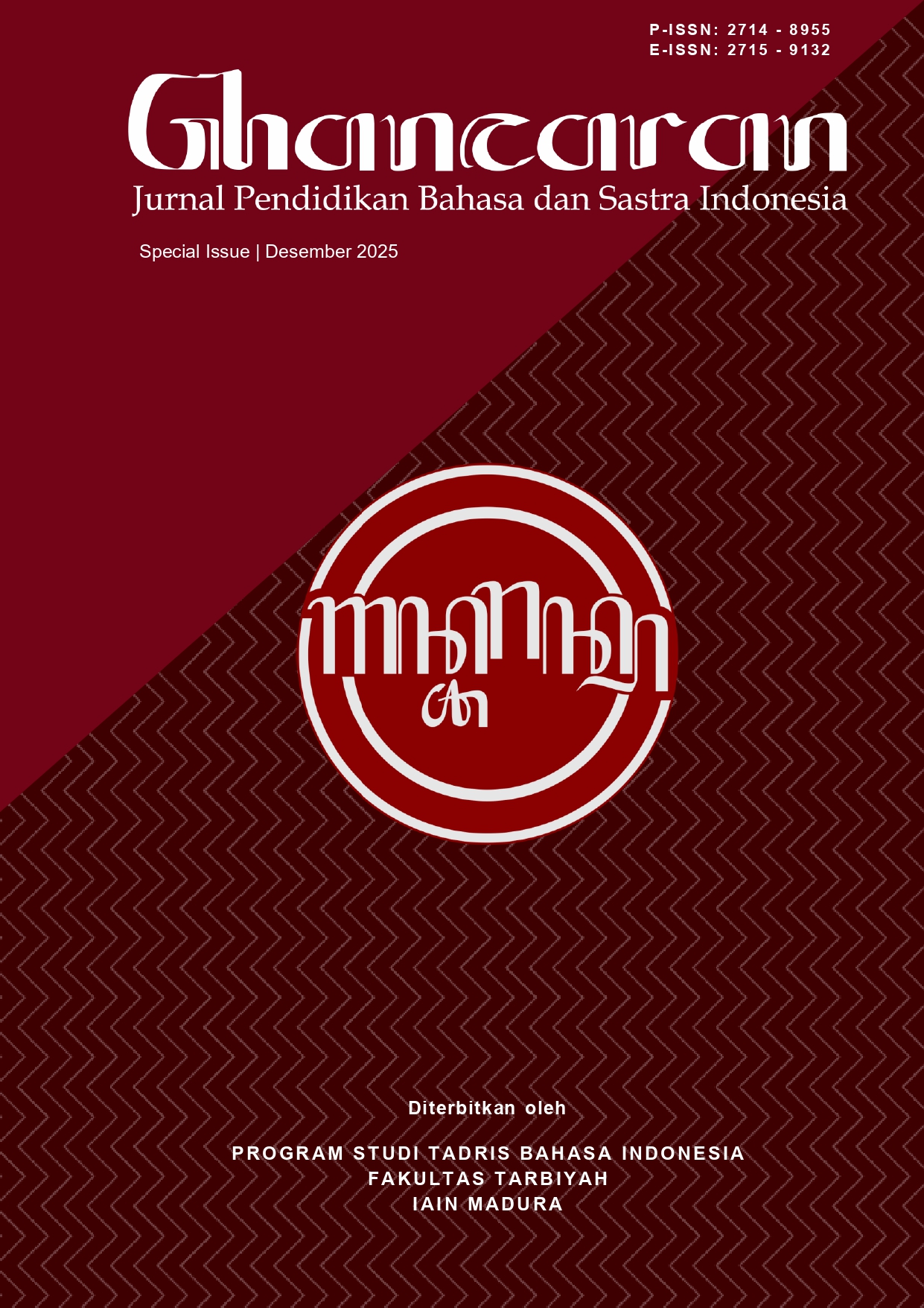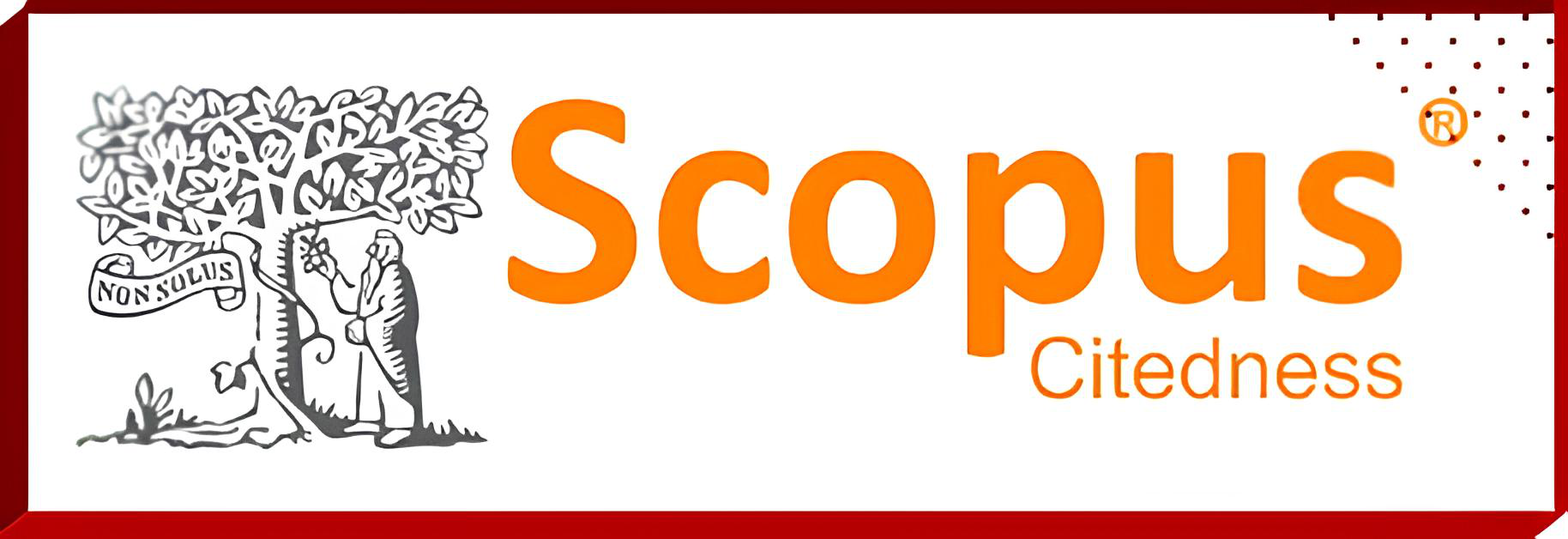Melawan Hegemoni Negara: Potret Perempuan Rural di Jawa dalam Novel Ulid Tak Ingin Ke Malaysia Karya Mahfud Ikhwan
 Abstract views: 131
,
Abstract views: 131
,
 PDF downloads: 82
PDF downloads: 82
Abstract
This research aims to explain the description of the ideology of state ibuism in the novel Ulid Tak Ingin ke Malaysia by Mahfud Ikhwan and how the narrative of resistance to it is through the depiction of female characters in the novel. This research uses qualitative and descriptive methods. The results of the research show that the hegemony of the ideology of state ibuism in the novel is represented through the character of Kaswati who plays the role of a good wife and mother in taking care of her husband and children. The resistance to the hegemony of state ibuism represented through the figures of Kaswati, Juwairiyah, and the women of Lerok village. The symbol of resistance carried out by Kaswati and the Lerok women is to leave their main duties as mothers and wives to work in Malaysia. However, behind the narrative of resistance, there is a narrative to return to the ideological symbol that is perceived by the opponents which is marked by the desire of female figures to return to the integrity of the family.
Downloads
References
Buana, C. (2009). Sejarah, Teori, dan Aplikasi Kritik Sastra Feminis. Al-Turas, XV(3).
Budianta, M. (2003). Merekam Penulis Perempuan dalam Sejarah Kesusastraan. Jurnal Perempuan, 30, 100–107.
Budiman, M. (2011). Meramu Estetika Kebimbangan: Telaah atas Visi Beberapa Pengarang Perempuan Indonesia Pasca-1998.
Budiman, M. (2015). Keberanian dan Kepengaturan: Membaca Kembali Dharma Wanita dan Warisannya pada Perempuan Kini.
Citradewi, A. P., & Tjahjono, T. (2023). Bentuk Hegemoni dan Kontra-Hegemoni Dalam Novel Kita Pergi Hari Ini Karya Ziggyzezsyazeoviennazabrizkie. BAPALA, 10(1), 271–285.
Damayanti, E., Sudikan, S. Y., & Rengganis, R. (2024). Belenggu Patriarki dalam Karya-Karya Oka Rusmini: Kajian Feminisme Radikal Kate Millet. Bahtera Indonesia; Jurnal Penelitian Bahasa Dan Sastra Indonesia, 9(1), 278–297.
De Stuers, C. V. (2017). Sejarah Perempuan Indonesia. Gerakan dan Pencapaian (2nd ed.). Komunitas Bambu.
Efendi, A. N., Abni, S. R. N., & Kurniawati, E. (2022). Hegemoni dalam Naskah Drama 5 Babak Atas Nama Cinta Karya Agus R. Sarjono: Perspektif Antonio Gramsci. Suar Betang, 17(1), 41-54.
Febrianto, D., & Tjahjandari, L. (2023). Reperesentasi Kekerasan Terhadap Perempuan Dalam Transformasi Novel Menjadi Film Seperti Dendam Rindu Harus Dibayar Tuntas. Adabiyyāt: Jurnal Bahasa Dan Sastra, 7(2), 154.
Hellwig, T. (2003). In the Shadow of Change: Citra Perempuan dalam Sastra Indonesia (1st ed.). Desantara.
Ikhwan, M. (2009). Ulid Tak Ingin ke Malaysia (1st ed.). Jogja Bangkit Publisher.
Indriani, L. & W. (2019). Feminitas dalam Pandangan Novelis Laki-laki. Prosiding Seminar Literasi IV , 169–176.
Khristianto. (2008). Beberapa Aspek Seputar Sastra Wangi. Leksika, 2(2), 11–20.
Loekito, M. (2003). Perempuan Sastra Pria. Jurnal Perempuan, 30, 65–76.
Romadona, M. T. (2020). Louis Althusser dan Filsafat Sebagai Yang Politis. JAQFI: Jurnal Aqidah Dan Filsafat Islam, 5(2), 197–236.
Rozida, S. (2016). Relasi Negara Dengan Masyarakat Sipil Dalam Novel Ulid Tak Ingin Pergi ke Malaysia Karya Mahfud Ikhwan. Universitas Gadjah Mada.
Septiadi, H. N., Andayani, & Wardani, N. E. (2019). Muatan Nilai Pendidikan Karakter Religius dalam Novel Ulid Karya Mahfud Ikhwan. Seminar Nasional Inovasi Pemebelajaran Bahasa Indonesia Di Era Revolusi Industri 4.0, 67–70.
Siswati, E. (2017). Anatomi Teori Hegemoni Antonio Gramsci. Jurnal Translitera, 5.
Suaib. (2021). NIlai Historis-Sosiologis dalam Novel Ulid Karya Mahfud Ikhwan (Kajian Strukturalisme Genetik Lucian Goldmann). Universitas Negeri Makassar.
Sugiarti, Andalas, E. F., & Setiawan, A. (2020). Desain Penelitian Kualitatif Sastra (1st ed.). Universitas Muhammadiyah Malang.
Suryakusuma, J. (2011). Ibuisme Negara Konstruksi Sosial Keperempuanan Orde Baru (1st ed., Vol. 1). Komunitas Bambu.
Suwandi, I. (2003). Menghidupkan Perempuan Melalui Sastra. Jurnal Perempuan, 30, 35–49.
Yulianeta. (2014). Hegemoni Ideologi Gender dalam Novel Era Reformasi: Telaah atas Novel Saman, Tarian Bumi, dan Tanah Tabu. METASASTRA: Jurnal Penelitian Sastra, VII(2).
Copyright (c) 2025 GHANCARAN: Jurnal Pendidikan Bahasa dan Sastra Indonesia

This work is licensed under a Creative Commons Attribution-ShareAlike 4.0 International License.
Ghancaran: Jurnal Pendidikan Bahasa dan Sastra Indonesia uses an Open Access Policy under the Creative Commons Attribution-ShareAlike 4.0 International License. Authors publishing in this journal agree to the following terms:
- Ghancaran Journal holds the copyright and grants the journal rights for first publication with the work simultaneously licensed under a

The work is distributed under Creative Commons Attribution-ShareAlike 4.0 International License which allows others to share, copy, and redistribute the material in any media or format and adapt, remix, change, and develop the material even for commercial purposes, as long as it is stated credit and license derivative works under similar terms. - Authors may make additional contractual arrangements for non-exclusive distribution of the journal's published work version.
- Authors are permitted to post their work online (e.g., in institutional repositories or on their websites) before and during submission, as doing so may lead to productive exchange.



















